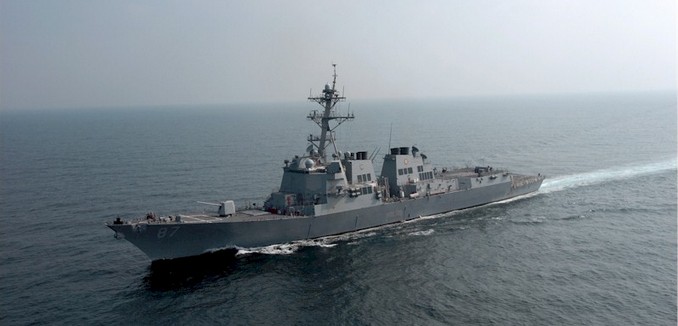Iran is likely behind a series of attacks by Yemeni rebels on American ships in recent weeks, the top United States commander stationed in the Middle East said Wednesday.
“I do think that Iran is playing a role in some of this,” Gen. Joseph Votel, the commander of the U.S. Central Command, said in a talk at the Center for American Progress. “They have a relationship with the Houthis, so I do suspect there is a role in that.” The Houthis are Iran-backed rebels who forced the Western-backed government of Yemen from the capital two years ago.
The Hill characterized Votel’s statement as “the closest a U.S. official has come to directly attributing the missile attacks to Iran.”
A U.S. official told Reuters this week that Iran had been stepping up its arming of the Houthis with “anti-ship missiles, explosives… money and personnel.”
A United Arab Emirates ship was severely damaged by rockets earlier this month while transiting the Bab-el-Mandeb Strait, through which much of the world’s oil is shipped. Over the course of the next week, the U.S. Navy destroyer USS Mason, which had been deployed to the area following the attack on the UAE vessel, was fired upon at least twice while patrolling the strait. The Mason later destroyed three radar sites in Houthi-held territory.
In addition to the attacks in the Strait, Iran has also increased its belligerence in the Persian Gulf since the implementation of the nuclear deal in January. There have been 31 incidents between Iranian and American ships since than that the U.S. Navy has deemed “unsafe,” “unprofessional,” or both, which is the same amount for all of 2015. “We’ve seen an uptick in confrontations by Iranian vessels in the Arabian Gulf,” Votel said last month. “Ultimately, if they continue to test us, we’re going to respond and we’re going to protect ourselves and our partners.”
Seven armed boats of the Islamic Revolutionary Guard Corps (IRGC) Navy swarmed a U.S. Navy patrol ship in the Persian Gulf in September, forcing it to change course after the Iranians came within 100 yards and stopped their vehicles in the American ship’s path. Sailors aboard the USS Nitze recorded an encounter in August when Iranian boats came as close as 300 yards, forcing it and the Mason to change course to avoid a collision. Two weeks later, two U.S. patrol coastal ships, the USS Tempest and the USS Squall, were operating in international waters in the northern Gulf when IRGC boats approached them at high speed and passed within 600 yards of the Tempest three times. The Iranians ignored several radio warnings to behave according to internationally recognized maritime rules. These incidents came just a few months after ten American sailors and their two boats were seized by IRGC naval forces in January of this year, in violation of international law.
In a move that reflects Iran’s growing belligerence towards the U.S. presence in the Persian Gulf, a new ship launched by the IRGC Navy in September was draped in a banner that read, “America should go to the Bay of Pigs, the Persian Gulf is our house.” “This ship increases the deterrent power of Iran and will have an effect on the calculations of the enemy, particularly America,” said IRGC Navy Chief Rear Adm. Ali Fadavi.
[Photo: U.S. Navy / WikiCommons ]




